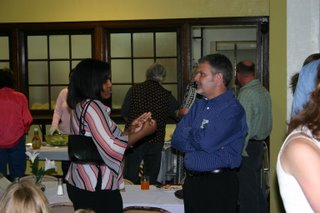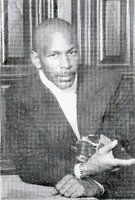Education -- Building Up One Another in Love
What a day Sunday was. It was Rachel's last sermon before heading off for her clergy renewal leave -- to New Zealand, and Alaska, and Hawaii and Guatemala. She's focusing her time away on the subject of radical hospitality -- and in those places she really ought to find some very diverse and wonderful teachers and friends. After worship we had a big party wishing her bon voyage and saying Good Bye to Callie Smith who has been our intern at Broadway for the last year -- and has been valued for her sharing of our life together in this place. In her sermon Rachel focused on the passage from I John which challenges us to love another -- and that this is the only way in which we know the love of God -- in our love for one another.
Later in the afternoon I headed off with De'Amon to hear our friend Dave Labrum out at the St. Vincent Hospice talk about his new book -- and tell the stories of some folks he has worked with that have used art in the healing process of dealing with the grief of the deaths of in many cases their children and in a few others, their spouses.
Radical Hospitality, Death, Grief and Art were some pretty heavy topics -- and we had barely hit mid-afternoon.
Kathy, Conor, Jordan and I headed off to Chris and Eric's in the evening for dinner and conversation. We spent a lot of the time talking with them about Conor's upcoming immersion in Spain for seven weeks this summer. Eric and Chris go to our church. Eric was Conor's Spanish teacher his first two years at Tech High School. Chris is working on his graduate degree at IU and will soon be heading off to Kazakstan (I'm sure I spelled that wrong -- sorry Chris) for a year to work in helping strenghten education in this new country.
The talk slowly turned from Conor and Jordan's education (Jordan is in 6th grade at Shortridge) to education in general and what is happening in and to public education in Indianapolis and across the country. Jordan complained about some of the discipline (or lack thereof) in a few of his classes and in the school. One of the strange things about that is that I know Jordan really likes it there at Shortridge. He can tend to see only the problems - but if he is truly miserable, you know it. And he isn't. But, as his father, I wonder how to help him see the way he can make a positive contribution...so that he doesn't just feel helpless and victimized (though that seems too strong a word). Actually, he is doing something hopeful and helpful which I'll write about another day -- perhaps that is my role as his father -- to remind him about what he is already doing.
Eric talked about how he is considering moving to another school. He loves his co-workers and his students -- but he also has a lot of frustrations. He talked about those frustrations and I felt that what he was expressing was that the best he could do -- the best they were able to do at school was just help a few kids beat the odds (my language). My own words for what he seemed to long for was an educational system that helps change the odds for everyone. Chris seemed to see some signs of hope -- as I understand it he sees it as a good sign that schools all are being held to similar standards in terms of the testing that is required across the board -- and the challenges that states and school corporations are offering to the No Child Left Behind strategy.
I thought of Rob Faulkens in our congregation who has just taken over as the new principal of Crispus Attucks Middle School (soon to be a grade 7-12 academy) -- the mural at the top of this piece is from the school. I wonder how he will handle these issues. My brother, Alan, is the principal of a newly restored high school in the Englewood neighborhood of Chicago. Both of these two men have big challenges facing some of the same issues that Eric was talking about here in Indianapolis and that Chris is working with on the other side of the world. Debbie Vawter in our congregation is the principal of an elementary school here in Indianapolis. Bob Taylor is on the school board in Washington Township. We have many educators at all levels throughout our congregation. And from my perspective they are doing pretty extraordinary work. It iss clear to me that these people have a calling and they feel it deeply. They also seem to carry a heavy burden and feel as if they are waging, very much of, a uphill battle. They can't help read the paper and the harsh words that there are for educators and schools.
From my perspective we have asked our schools to take on issues that we are unable (or unwilling) to take on as a society. The schools become our scapegoats. I think that our teachers and administrators, at least the ones I know, are doing magnificent work, good and holy work, even courageous work -- and for the most part -- at least publicly they are disparaged for it. But they aren't the only ones. Parents and children come under heavy attack as well. I hear classes and races of young people spoken of with barely disguised disgust. I hear many people talk about "parents who don't care." I have lived and worked in low income neighborhoods in cities for over 20 years - and I have never met a parent who doesn't care. I'm not saying there aren't any -- but they are fairly invisible to me. The reason our schools have a tough time, it seems to me, is that there is still injustice, there is racism, there is poverty, there is inadequate health care. And all these things help undermine a strong education. I'm not saying it's impossible -- but it is impossible if we pretend like those other problems simply aren't there -- or don't make any difference.
Several years ago at a school board meeting in South Bend I remember hearing a Notre Dame professor remark, off-handedly, that "of course you know that the single most important factor in educational achievement in income level." That wasn't the point of what he was saying -- it was just a throw away line in the midst of a much larger point. But what I was thinking was that we never attack the issue as if this was true. We mostly just attack the schools. I think it's hard to have a school that is different than it's community. If the community it sits in the middle of -- thinks of itself as empty, needy and poor -- then it is difficult for the school to address that during the hours it is open. It can be part of the answer -- but they are only a part.
Schools could do a better job of involving parents. I know as a parent in an urban school system I have often found it very frustrating to be involved. I have filled out a form every year -- in the 12 years we have been in the schools I can count on one hand the number of times I have been followed up with on any of those forms. And when I have atempted to follow up -- the bureaucracy has been nearly impossible to wade through. If that's tough for me who is fairly aggressive -- what about a younger, less agressive parent -- aren't they even more likely to not be involved at the school? And yet every school that I've been involved with has set in the midst of a residential neighborhood. Many of these neighborhoods are filled with older folks who feel under utilized, and under appreciated. What if the PTO/A were to hire/give a stipend to an elder in the community around the school who could and would organize the parents and others in the larger community and get them and keep them involved in the school (I think the school itself simply is too overwhelmed to follow up on the surveys, much less follow up with neighbors who aren't related biologically to their students). Wouldn't that help begin to build up the connections and commitment to the school in all sorts of ways? And what would it look like if young people saw their neighbors and family members giving themselves to the school. They would see how much others around them value it...and they would grow up with a sense of responsibility for themselves to be involved.
Another idea that the Mapleton Fall Creek Community Development Corporation in our neighborhood is doing is another example of at least an attempt at building up community through education and the schools. One of the things often pointed out about urban education is the many drop outs there are -- and that is true. The drop out rate is too high. But all the efforts that have been made to improve or correct that haven't seemed to pan out. So isn't a new effort worth a try? While there are a lot of drop outs -- there are also quite a few who do graduate. And those should be celebrated. The Corporation is joining the Juneteenth Celebration at the Children's Museum and will be celebrating the young people and their families who are graduating. Also at that time, we will be handing out (publicly) the scholarships being awarded by the various neighborhood institutions (including the Eugene Smith Scholarship at Broadway UMC). Yes...there are too many drop outs...but there are graduates in our neighborhood and wonderful families that have supported them -- and also our neighborhood supports our young people -- and we are going to let folks know.
These types of efforts can be part of the solution. It won't be quick...but we need to multiply this type of creativity. We need to try as many and varied ways as we can to both strengthen our community's commitment to it's schools and also to celebrate the goodness and the ties that are already there. This will be a lot more helpful to building up the schools than constantly beating them up in the press, demonizing the parents, and giving up on public education.
I'm reminded once again -- that technology is a wonderful tool, but it isn't a solution. Love is. Our love for one another. Our love for our community.
One final thing that I've seen that I like is that over in the Ohio conferences (East and West) of the United Methodist Church I have been pleased to see the two bishops holding hearings throughout their conferences on education. I like that. I think that this is a good beginning point for making a response to what is happening. If at these hearings there are students and teachers and administrators and parents and school board members and elders and business people and clergy and on and on who are speaking their dreams, their hopes, and their sense of call about what to do...I can hardly think of a greater gift that we could give. We need to set people free to give what they have to offer. Not to do so...it seems to me is a sin. It also is a denial of the resurrection and our celebration of the Spirit's presence in the life of the world (not just in the church). I think we should hold such hearings on health care and poverty and other things as well...If we take the time to listen to each other...then we will almost certainly all learn a lot.
It is Radical Hospitality and Life and Death and Grief and Dinner with Friends that helps us see the presence of the realm of God. Or at least that's how it works for me.








